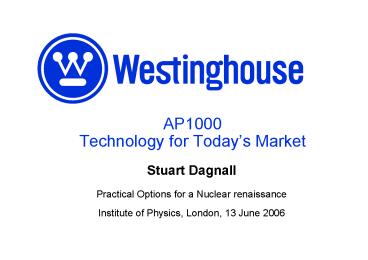AP1000 Technology for Todays Market - PowerPoint PPT Presentation
1 / 22
Title:
AP1000 Technology for Todays Market
Description:
No penetrations below nozzles. Reactor vessel insulation. design allows cooling water ... Low cobalt removable top nozzle. Highest fuel reliability. Page 12. File ref: ... – PowerPoint PPT presentation
Number of Views:353
Avg rating:3.0/5.0
Title: AP1000 Technology for Todays Market
1
AP1000Technology for Todays Market
Stuart Dagnall
- Practical Options for a Nuclear renaissance
- Institute of Physics, London, 13 June 2006
2
Best Solution for New Plants is SIMPLIFICATION
AP1000
- Simplicity in
- Design
- Safety
- Construction
- Procurement
- Operations
- Maintenance
Modular Construction
Passive Safety Systems
Short Engineering and Construction Schedule
Innovative Design Features
Reduced Components Commodity Components
US Licensing Approval
NRC Approves Certification of Westinghouses
AP1000 Advanced Reactor Design
3
The Westinghouse AP1000
- A compact station
- 3415 MWt, primary system
- 1117 MWe
- 2-loops, 2 steam generators
4
AP1000 Reactor Safer, Simpler, Economical
- Features
- Passive engineered safeguards systems
- Much simpler less equipment
- Achieves new levels of safety
- Modular construction
- Reduces construction time
- Increases control of cost and quality
- Canned motor reactor coolant pumps
- Simpler
- Maintenance free
- Designed to compete with fossil-fuelled plants
5
Reactor Coolant System
- Canned motor pumps mounted in steam generator
lower vessel head - Elimination of RCS loop seal
- Large pressurizer
- Top-mounted, fixed in-core detectors
- All-welded core shroud
- Ring-forged reactor vessel
6
Passive Core Cooling System
- AP1000 does not rely on safety-grade AC power
- Passive residual heat removal
- Passive safety injection
- Passive containment cooling
- Long term safe shutdown state 72 hours without
operator action
7
Passive Containment Cooling
8
Severe Accident Mitigation DesignIn-Vessel
Retention
- In the unlikely event of core melt
- AP1000 designed to retain core debris within the
reactor vessel - No penetrations below nozzles
- Reactor vessel insulation design allows cooling
water flow path on outside of vessel - Cooling flow driven by natural circulation
- Water source In containment refueling water
storage tank - Automatic Depressurization System relieves
pressure build up - Large release frequency 5.9 x 10-8 per reactor
year URD requirement lt10-6 per reactor year
9
Simplicity Achieves New Level of Safety
U.S. NRCRequirements
CurrentPlants
UtilityNew Plant Requirements
AP1000Results
1 x 10-4
5 x 10-5
lt1 x 10-5
5 x 10-7
Core Damage Frequency per Year
- Moreover, with the features already
incorporated in the AP1000 design, the ability to
estimate CDF and risk approaches the limitations
of probabilistic techniques
- U.S. NRC in approval of AP1000 certification
10
Thorough Testing of AP1000 Passive Systems
Completed
Oregon State ¼ Scale, Long TernIntegral Systems
Test
Full Height, Full Pressure, IntegralSystems Test
(SPES)
Large-Scale Heat Transfer PCS Test
11
Fuel Assembly
- Robust fuel design
- Advanced ZIRLOTM material
- Debris tolerant features
- Intermediate mixing grids
- Integral burnable absorbers
- Larger fission gas plenum
- Annular enriched axial blankets
- Low cobalt removable top nozzle
- Highest fuel reliability
12
The AP1000 is Dramatically Smaller and Simpler
AP1000
Evolutionary PWR
Size Matters
13
Simplification Eliminates Components gtgt Reduces
Cost
45 LessSeismic BuildingVolume
85 LessCable
50 FewerValves
35 FewerSafety Grade Pumps
80 LessPipe
14
Construction Simplicity - 36 Months
15
AP1000 Schedule Validation
- Schedule Validation via New 4D tools
- Allows the details of construction, erection,
and test activities as well as their interactions
to be worked out well in advance of actual
construction
16
Parallel Tasks Using Modularization Shorten
Construction Schedule
17
Module Construction
- Module Type Number
- Structural 122
- Piping 154
- Mechanical 55 equipment
- Electrical 11 equipment
- 342
Pump/Valve Module
Structural Module
Raceway Duct
Depressurization Module
18
Economic Competitiveness
- Reduced capital costs through Passive technology
- Smaller seismic building volume
- Fewer pumps and valves
- Less safety related piping and cabling
- No safety related diesels
- 36 month construction schedules
- Modular construction
- Lower Operations and Maintenance Costs
- Fewer components to maintain
- No Reactor Coolant Pump Seals
- OM staffing 1/3 lower than current operating
nuclear plants - Smaller footprint of safety systems structures
keeps security costs under control
19
Technology Choices are already being made in the
US
- Key factors driving Utilities decisions
- Safety
- Economics
- Delivery
20
A New Licensing Approach in US
- In 1989 U.S. NRC established alternative plant
licensing process 10 CFR Part 52 (operating
plants licensed under earlier 10 CFR Part 50) - Seeks to resolve licensing issues early in the
process reduces regulatory uncertainty - Milestone achieved NRC has certified the AP1000
design under 10 CFR Part 52. - AP1000 COLs to be submitted to NRC beginning 3rd
quarter, 2007
21
US Market Signals Are Clear
- Combined Construction Operating Licenses (COL)
We believe the Westinghouse AP1000 is the best
nuclear technology option available at this time.
Our decision comes after researching the next
generation of nuclear reactors available. -
Louis Long, vice president of Technical Support
for Southern Nuclear
Utilities are Overwhelmingly Choosing Passive
Reactor Technology
22
AP1000Ready to meet the Energy Challenge

